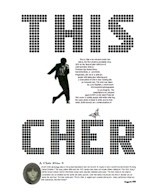 This is the first Cher special that has occurred since I've had my blog (which started in the fall of 2006). And I have to say, my two favorite Cher things in the world are Cher albums and Cher TV specials. I think this comes from starting to be a Cher fan in the early-to-mid 1970s when Cher was all about some flashy-fun TV Specials.
This is the first Cher special that has occurred since I've had my blog (which started in the fall of 2006). And I have to say, my two favorite Cher things in the world are Cher albums and Cher TV specials. I think this comes from starting to be a Cher fan in the early-to-mid 1970s when Cher was all about some flashy-fun TV Specials.
I noticed some old-tyme Cher special feeling while I was watching this one (luckily Mr. Cher Scholar was at work or he might have been disturbed to see it): childlike excitement, a feeling of suspended time, and then a slight sad fretting that the special would be over in one short hour. A Cher special for me is then like Marcel Proust's madeleine cake in In Search of Lost Time, a key to a vivid childhood memory. I watched it three times.
I loved seeing never-before-seen pictures of Cher as a kid and hearing the family delving into their history in Arkansas.
Bits about the family
Cher calls her history a "strange American story" but it's probably not so strange. Definitely interesting. Definitely American. She kids her mom that they "can only walk the narrow razor wire of white trash so long."
I loved all the stories about Georgia's grandparents, her fierce grandmother who defends her mother with a broken bottle and her mean grandfather who blows himself up while working dynamite to blow up stumps while the railroads in Arkansas were being built. This story is downright poetic with the psychic daughter's graphic dream predicting it. In newspaper reports, Lynda is called a "self-proclaimed psychic." It would be interesting to hear more about her other uncanny predictions or how the family felt about having some psychics in it. Lynda comes across as a very complex figure who is never described mean as such but does her share of mean things.
I wish we had learned more stories about Roy too who spent so much time with Georgia and who, it seemed, Cher knew as a child. He is described also as a complex of mean and funny. When did these family members die? What did they do while they were in California? And what about the story about Roy's attempt to kill Georgia and her brother Mikey. We learned nothing about Mikey.
Cher affirms that her grandmother Lynda's mother was either a quarter or a half Cherokee. Cher claims it was her great-grandmother who taught her grandmother the Rabbit and War Dance. She said although that doesn't make her very Indian, "Half Breed" was a good song to sing.
Bits about Georgia
 Georgia was born in Kensett, Arkansas, on June 9, 1926. Her father Roy was 21. Her mother Lynda was 13. She started singing at five and became state champion, described as a blues singer, in Arkansas (May 29, 1938). It was Bob Wills who encouraged her father to take her to Hollywood and they hitchhiked. Georgia talks about being perceived as a "dumb Oakie" when she came to LA. She explains why she changed her name from Jackie Jean Crouch (which she liked) to Georgia Pelham (in honor of a dead friend) and where Holt came from (last husband's name). Her Dad worked at the famous Cliffton's Cafeteria. (It's still open! Go eat there…it's so kitchy!).
Georgia was born in Kensett, Arkansas, on June 9, 1926. Her father Roy was 21. Her mother Lynda was 13. She started singing at five and became state champion, described as a blues singer, in Arkansas (May 29, 1938). It was Bob Wills who encouraged her father to take her to Hollywood and they hitchhiked. Georgia talks about being perceived as a "dumb Oakie" when she came to LA. She explains why she changed her name from Jackie Jean Crouch (which she liked) to Georgia Pelham (in honor of a dead friend) and where Holt came from (last husband's name). Her Dad worked at the famous Cliffton's Cafeteria. (It's still open! Go eat there…it's so kitchy!).
Georgia talks about the squalid conditions of living in the slums near San Pedro, Main Street and Central Avenue. Georiga talks at length about her conflicting feelings about her early marriage to Cher's biological father, torn between her mother Lynda, John Sarkisian and an abortion. She tells more about the Catholic home in Scranton that wanted to keep Cher (which inspried Cher's critical song "Sisters of Mercy") and Georgia's eventual 6-week "Reno Cure."
Back from early struggles, Georgia won some beauty contests in Reno and LA (Miss Holiday on Wings) and won a Jack Carson scholarship to drama school with the Ben Bard Players. We get to see clips of her bit parts on both I Love Lucy and Ozzie and Harriet. You can see Cher's 1960's smile in some of these clips and head-shots. The family talks about Georgia being friends with Robert Mitchum and Lenny Bruce and a herd of beautiful people. The Asphalt Jungle story is told.
The list of husbands was illuminating but inconsistent:
- John Sarkisian (We find out where they meet and a few of their experiences as they relate to Cher, but don't find out anything about his character, his heroin addiction, his prison sentence, later-life conflicts with Cher after she became famous, when he died, etc.)
- Chris Alcaide (Also an actor, tall, loved Cher but they were only married "20 minutes" because he was very jealous.)
- John Southall (Georganne's father, described as one of the loves of Georgia's life, love at first sight, Cher calls him "dark like me" and appreciates the attention he gave her when Georganne was born on September 7, 1951 and "everyone forgot I was alive"…but he was an alcoholic. Georganne says that when she or Cher refer to their Dad, they mean him.)
- Joe Collins (Nothing is said about him…is there jucy dirt behind the omission or was he really that boring?)
- Gilbert La Piere (Was a wall street banker and they lived in New York with him, was described as very Father Knows Best and not a good fit with the family. He died last year and because he adopted Cher and Georganne, his obits still describe him as Cher's father. Georganne kept his name.)
- Holt (His first name is never given and nothing is said about his character or why Georgia married him.)
We hear much about Georgia's longtime boyfriend, Craig Spencer, who came into the picture while Georgia was running Grannys Cabbage Patch quilt shop in Brentwood in the late 1970s. It was Craig who encouraged her to record an album at a West Lake studio. Craig was 30 and Georgia was 51. Craig and Georgia are shown being interviewed by Oprah early in her career. In old late-1970s clips, Georgia talks about having the same vocal resonance and register as Cher. Craig and Georgia talk about their disappointments that the album was shelved due to contract disputes. Craig laments, "50% of something is better than 50% of nothing." The recordings languished for years in Georgia's Palm Desert garages. Cher says they shouldn't  have survived.
have survived.
Georgia comments a bit on her depression and how she became "a royal pain" after this late career setback but nothing about family depression is elaborated on. Georganne talks about Georgia's unique carriage and demeanor and I think that was spot on. Cher calls her before her time.
Bits about Georganne
We learn all the many shows Georganne appeared in and it's an impressive listing: General Hospital (where she created the mean-girl character of Heather), Ozzie's Girls (with a young Matt Harmon), Welcome Back Kotter, Happy Days, Fantasy Island, TJ Hooker, Police Woman, The Streets of San Francisco. Would love to see her full reel!
Cher talks about living her life like a bumper car. Georgia claims Cher is stronger and braver than she is. Cher and Georgia tell the story of Cher's arrest (on January 27, 1959, complete with mugshot) and how the event started at a bowling alley before Cher drove off in the borrowed car to get a sandwich. A picture of the famous LA-eatery Johnnie's Pastrami is shown. By the way, the profile and head-shot of the mugshots do not match.
Scenes from the TV biopic The Beat Goes On are show to illustrate Cher's stories about moving out of the house as a teenager and moving in with Sonny. I've always wondered if Cher approved of that movie based on Sonny's tell-all book. Cher indicated that Georgia threatened to put Sonny in jail. Cher was in her teens and Sonny was nearly 30. I wonder how far Gerogia's threat went and if it was a real concern for Sonny. Interestingly, Cher talks about her anger when she finally ran away and back to Sonny, kicking out her bedroom window screen in what she describes as a dramatic scene.
Georgia eventually got used to the idea of Sonny and talks about how proud she was of Cher when she visited Sonny & Cher the set of Good Times.
The final word on spellings and dates (?)
Sarkisian as in Cherilyn Sarkisian. She was named for Lana Turner's daughter Cheryl combined with Georgia's mother's name Lynda. It's interesting that Georgia picks all her names based on women in her life. Cher was born May 20, 1946.
Even the special could not clear up the cloudiness surrounding spellings of LaPiere. In the beginning of the special, Georganne's name was spelled Lapiere Bartylak (no space, small P) and by the end of the special, husband #5 had his name spelled Gilbert La Piere (space and a big P). Gilbert's obit spells his name LaPiere. In any case, there are no two letter Rs in any of these versions.
Chaz Bono was born Chastity Sun Bono on March 4, 1969.
Elijah Blue Allman was born on July 10, 1976. (Why did he wear sunglasses throughout the special?)
There were things I missed that a one-hour special couldn't hope to cover: a sturdier timeline of when Georgia's family moved from Arkansas to Oklahoma to California. More Arkansas stories, more stories of Cher's grandparens. A more complete list of the husbands with dates and more anecdotes. I know Georgia married John Sarkisian twice but I still don't know which other husband Georgia married twice. She had 8 marriages and 6 husbands.
It's rumored Cher might do a mini-series about the family saga. Mom at least should get a book if nothing else. After all, we never did hear the awful cat story.

More good stuff:
- The promo commercial
- Extensive 1988 story on Georgia Holt
- People Magazine 1978 story on Georgia's nightclub act
- Newspaper clipping about Grannys Cabbage Patch
- The site CherLove's pictures of Cher and Chastity at the opening of Grannys Cabbage Patch
- Somewhat imperfect ancestry chart of Cher



























